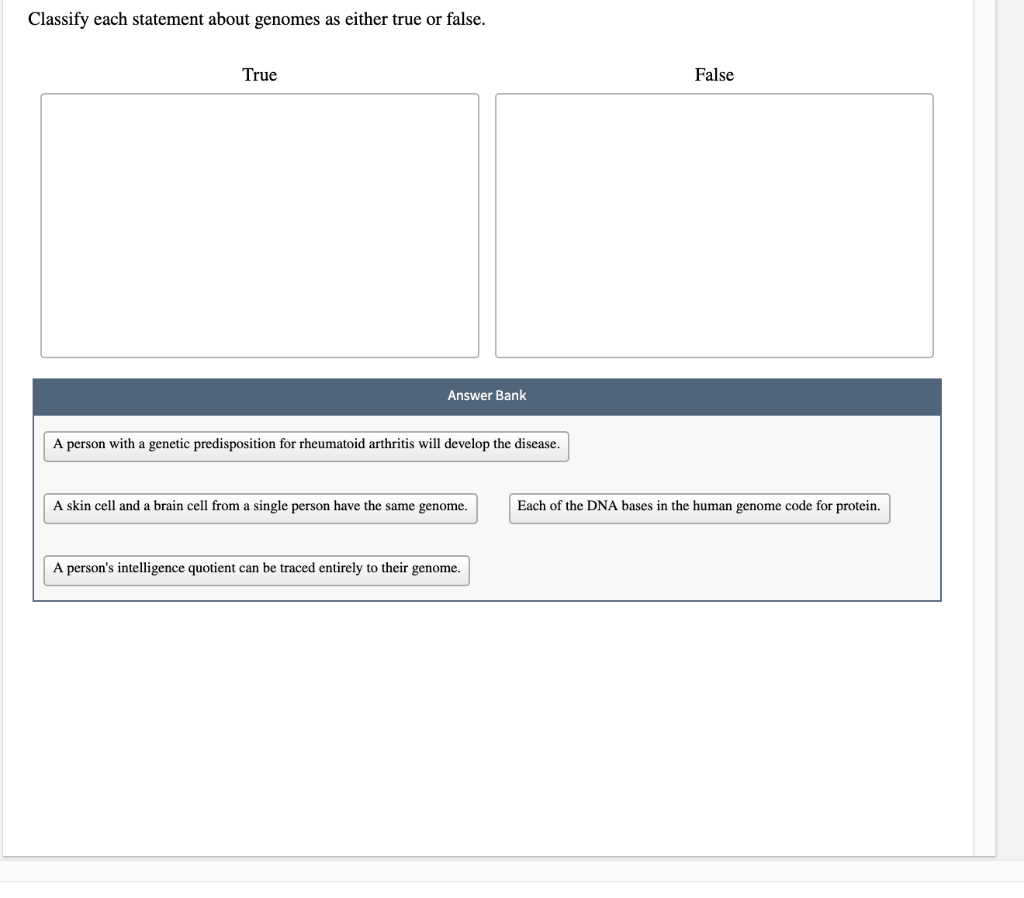Genomic studies have vastly enriched our comprehension of biological diversity, illuminating the mechanisms underlying evolution and inheritance. When examining statements regarding genomes through the lens of cultural relativism, we invite a profound exploration of how diverse cultural perspectives shape our understanding of genetics and its implications. This article will present various statements about genomes classified as true or false, intending to test knowledge while inciting curiosity about the cultural context surrounding genomic science.
Understanding the Concept of Genomes
To embark on this intellectual journey, it is essential first to clarify the fundamental concept of a genome. A genome encompasses the complete set of genetic material within an organism, consisting of both the genes—segments of DNA with specific biological functions—and the non-coding sequences that play critical regulatory roles. The human genome, for example, comprises over three billion base pairs and approximately 20,000-25,000 protein-coding genes. Yet, in different cultures, the interpretation of what this means varies significantly.
Statement 1: “All genomes are identical within a species.”
This statement is unequivocally false. Although organisms of the same species share a highly similar genome, genetic variation, whether due to mutations, environmental adaptations, or epigenetic factors, ensures that no two individuals are ever genetically identical (except in the case of identical twins). Cultural frames often influence perceptions of individuality and sameness, and understanding genetic variation within a species captures the essence of biological and cultural diversity.
Statement 2: “Genomes can be altered through environmental interaction.”
This statement holds true. The interaction between genomes and environmental factors exemplifies the concept of phenotypic plasticity, where an organism’s phenotype—the observable physical and functional traits—can change in response to environmental influences. This principle reverberates through various cultures, wherein environmental adaptations are often viewed as intrinsic to survival. For instance, indigenous populations of the Arctic exhibit physiological adaptations that resonate with their cultural practices and natural surroundings, showcasing a profound interplay between genetics and environment.
Statement 3: “Genomic sequencing is a recent technological advancement.”
True. The advent of genomic sequencing as a method of deciphering the genetic code is relatively recent, with landmark developments occurring in the late 20th century. The completion of the Human Genome Project in the early 2000s marked a pivotal moment in science, democratizing access to genetic information and sparking a plethora of ethical discussions across cultural contexts. Questions arise about ownership, privacy, and the implications of genetic data, which vary depending on sociocultural values and norms.
Statement 4: “Genetic predisposition determines behavior conclusively.”
This statement is misleading and requires nuanced clarity. While genetic predispositions undoubtedly influence behavioral tendencies, they do not definitively determine behavior. This paradigm is essential in cultural relativism, where the interplay of nurture, social structures, and cultural teachings profoundly impacts human behavior. Numerous studies convey that environmental factors and community norms can significantly alter behavioral expressions, making it essential to consider context before categorically attributing any characteristic to genetics alone.
Statement 5: “Invasive genome editing techniques, like CRISPR, are devoid of ethical considerations.”
This assertion is entirely false. The emergence of genome editing techniques such as CRISPR-Cas9 has ushered in a new era of scientific capability; however, it simultaneously incites a plethora of ethical dilemmas. The cultural ramifications of editing genomes, particularly in humans, touch on intricate issues related to identity, consent, and biological integrity, demanding dialogues that incorporate diverse cultural perspectives. Different societies articulate distinctive stances on genetic engineering, influenced by their historical, ethical, and philosophical backgrounds.
Statement 6: “Genomic research is universally embraced across cultures.”
This statement is false. The acceptance and interpretation of genomic research are heavily influenced by cultural beliefs and values. For example, certain communities may exhibit skepticism towards biotechnological interventions due to traditional beliefs or historical exploitation in medical research. It is imperative to approach this subject with sensitivity and respect for varying cultural attitudes towards biological innovation, reinforcing the importance of cultural relativism in scientific discourse.
Statement 7: “Ancient genomes can provide insights into historical migrations of populations.”
This statement is true. Advances in paleogenomics have enabled researchers to extract and analyze ancient DNA, revealing intricate patterns of human migration and adaptation throughout history. These findings have profound implications for understanding cultural identities and transformations. As societies evolve, so do their genetic legacies, allowing for a rich canvas of human history viewed through both genetic and cultural lenses.
Statement 8: “The study of genomes is an isolated scientific pursuit.”
This claim is categorically false. The study of genomes extends far beyond biological confines, intertwining with various fields such as anthropology, sociology, and ethics. This interconnectedness invites a multifaceted examination of genomes through diverse lenses, enriching our understanding of human existence and the cultural implications of genetic research. The interpretation of genomic data can reflect broader socio-political contexts, emphasizing the symbiotic relationship between science and culture.
Conclusion: Embracing a Cultural Lens
The exploration of genomic science through a cultural relativist perspective illuminates the rich tapestry of human understanding regarding genetics. Statements about genomes, whether classified as true or false, engage us in a critical dialogue about the ethical, social, and cultural implications inherent in genetic research. As ongoing advancements in genomics continue to unfold, it is incumbent upon scientists, ethicists, and communities alike to approach these dialogues with respect and an open mind, fostering greater awareness and curiosity about the complex interplay of culture and genetics.
